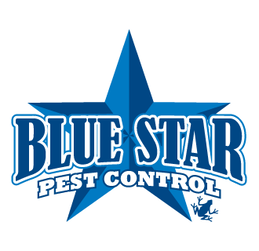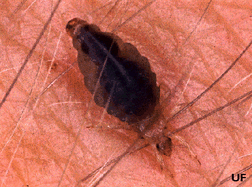Lice
There are three types of human lice, including: head lice, body lice, and pubic lice. These lice are tiny parasitic insects that can infest the skin anywhere on the body to feed exclusively on blood and lead to an infection characterized by intense itching. They are highly contagious, spreading from person to person by close body contact, shared clothes, and other items (such as hats, hairbrushes, and combs) which can lead to the spread of human disease agents such as those causing typhus and epidemic relapsing fever although none of the human lice are known to transmit any disease-causing pathogens in North America.
Identification
Lice are flat-bodied, grayish-black, wingless insects about 1/12 - 1/8 inch long that feed exclusively on blood in all life stages. They have six legs adapted for crawling (via claws) through hair or on clothing and are not capable of jumping any distance. The three types of human lice mentioned above - head lice, body lice, and public lice - must feed every 24 hours, and if they cannot do so they quickly starve to death. During their life, they can cause intense itching in affected areas and pink papules (small, solid and elevation of the skin). Lice can be detected by characteristic symptoms including persistent itching and redness, particularly on the scalp, on the back of the head, or in pubic areas (depending on the kind of louse).
Reproduction
All life stages are easy to see. Even the eggs, which are called nits ("getting down to the nitty gritty" and "nit-picking" refer to the detailed work involved in removing nits), can be recognized immediately: they are white to gray and are glued firmly to the base of hairs. If only nits are observed, never any adult lice, then the "nits" should be examined under magnification to prevent misidentification because there are instances where skin flakes and other debris in the hair can closely resemble nits. A piece of debris or dandruff will appear lumpy, angular, or asymmetrical under magnification while the actual louse edd, even when dead, will appear smooth and round. The nits are attached to their host's hair with specialized saliva which results in a bond that is very difficult to separate without specialized products such as a nit comb, a comb with very fine close teeth, used to scrape nits off the hair.
An adult female louse will lay 8 eggs a night and after only 7 days a young louse, also called a nymph, will emerge and start to feed. In only 10 days, the nympth will reproduce and go on to develop through three stages. Adult lice can live for 3 or more weeks.
Treatment
Specific treatment will be determined by your physician based on: your age, overall health, and medical history, extent of the infestation, tolerance for specific medications, procedures, or therapies, and expectations for the course of the infestation.
Identification
Lice are flat-bodied, grayish-black, wingless insects about 1/12 - 1/8 inch long that feed exclusively on blood in all life stages. They have six legs adapted for crawling (via claws) through hair or on clothing and are not capable of jumping any distance. The three types of human lice mentioned above - head lice, body lice, and public lice - must feed every 24 hours, and if they cannot do so they quickly starve to death. During their life, they can cause intense itching in affected areas and pink papules (small, solid and elevation of the skin). Lice can be detected by characteristic symptoms including persistent itching and redness, particularly on the scalp, on the back of the head, or in pubic areas (depending on the kind of louse).
Reproduction
All life stages are easy to see. Even the eggs, which are called nits ("getting down to the nitty gritty" and "nit-picking" refer to the detailed work involved in removing nits), can be recognized immediately: they are white to gray and are glued firmly to the base of hairs. If only nits are observed, never any adult lice, then the "nits" should be examined under magnification to prevent misidentification because there are instances where skin flakes and other debris in the hair can closely resemble nits. A piece of debris or dandruff will appear lumpy, angular, or asymmetrical under magnification while the actual louse edd, even when dead, will appear smooth and round. The nits are attached to their host's hair with specialized saliva which results in a bond that is very difficult to separate without specialized products such as a nit comb, a comb with very fine close teeth, used to scrape nits off the hair.
An adult female louse will lay 8 eggs a night and after only 7 days a young louse, also called a nymph, will emerge and start to feed. In only 10 days, the nympth will reproduce and go on to develop through three stages. Adult lice can live for 3 or more weeks.
Treatment
Specific treatment will be determined by your physician based on: your age, overall health, and medical history, extent of the infestation, tolerance for specific medications, procedures, or therapies, and expectations for the course of the infestation.




